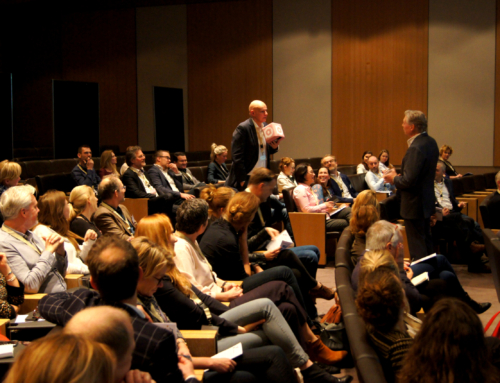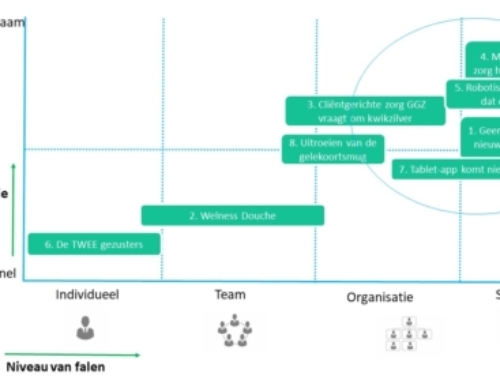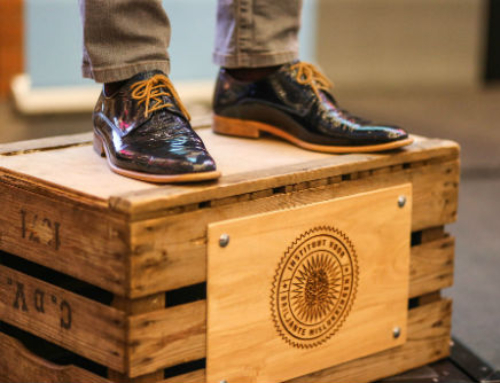In una riunione u mese passatu nantu à e bevande è i finger food, un specialistu di u Bancu Mondiale hà cuntatu a storia di cumu i tessituri femini in una regione amazzonica remota di Guyana si avianu contru à tutti i probabili un fiorente cummerciale in linea globale chì vende amache intrecciate per $1,000 a pezza.
A cumpagnia telefonica statale avia donatu un centru di cumunicazione chì aiutava e donne à truvà cumpratori in u mondu, vende in lochi cum'è u British Museum. À pocu tempu, però, i so mariti anu tiratu u plug, preoccupatu chì l'aumentu bruscu di u redditu di e so mogli era una minaccia per a dominazione tradiziunale maschile in a so sucetà.
U putenziale di a tecnulugia per fà u bonu suciale hè largamente esaltatu, ma i so fallimenti, finu à avà, sò stati raramente discututi da i nonprofits chì u implementanu. L'esperienza in Guyana puderia mai avè venutu à a luce senza FailFaire, un partitu recurrente chì i participanti si diverte in a revelazione di i difetti di a tecnulugia.
"Pigliemu a tecnulugia integrata cù i nostri valori è a nostra cultura è l'incorporemu in u mondu in via di sviluppu, chì hà valori è culture assai diverse," Soren Gigler, u specialistu di u Bancu Munniali, disse à quelli à l'eventu di FailFaire quì in lugliu.
Daretu à l'avvenimenti hè un gruppu senza prufittu basatu in Manhattan, MobileActive, una reta di persone è urganisazione chì prova à migliurà a vita di i poveri per mezu di a tecnulugia. I so membri speranu chì l'esaminazioni spensierate di i fallimenti si trasformeranu in esperienze di apprendimentu - è impediscenu à l'altri di fà i stessi sbagli..
"Pensu assolutamente chì imparemu da u fallimentu, but getting people to talk about it honestly is not so easy,” said Katrin Verclas, a founder of MobileActive. “So I thought, why not try to start conversations about failure through an evening event with drinks and finger foods in a relaxed, informal atmosphere that would make it seem more like a party than a debriefing.”
There is also a prize for the worst failure, a garish green-and-white child’s computer nicknamed the O.L.P.C. — for One Laptop Per Child — a program that MobileActive members regard as the emblem of the failure of technology to achieve change for the better. When Ms. Verclas held it up during last month’s party, the room erupted in laughter. (Jackie Lustig, a spokeswoman for O.L.P.C., said the organization did not consider its program a failure.)
With the prize in his sights, Tim Kelly, a technology specialist at the World Bank who had just flown in from South Africa, found himself in front of a screen displaying what looked like a line drawing of a bowl of spaghetti and meatballs but in fact was an effort to explain the roles and relationships of the many partners in the Global Capacity Building Initiative, a program aimed at building strong policies and regulatory environments to foster the expansion of the Internet in developing countries. “This is the point in the evening where I’m suddenly asking myself why I let myself be talked into this,” Mr. Kelly said.
He nonetheless gamely continued. Un grande prublema cù u prugettu hè chì trè gruppi chì raccoglianu soldi per ellu eranu più interessate à cullà soldi per elli stessi., Mr. Kelly said. "Unu hà riunitu soldi è quandu hà finitu di fà questu, pigliò i soldi è si n'andò è hà fattu u so propiu travagliu,” Mr. Kelly said.
L'iniziativa hà avutu troppu "attori," continuò. I paesi donatori vulianu cose assai diverse. Era troppu cumplessu, disse, gestu à a ciotola di spaghetti.
Prossima volta, disse, ellu avissi favuritu per una iniziativa chì currisponde à donatori specifichi à prughjetti specifichi è ùn travaglià cusì duru per esse tutte e cose à tutti i persone..
I so ottu minuti di tortura sò finiti, Mr. Kelly tornò à a so sedia, pare un pocu alleviatu.
Mr. U patronu di Kelly, u Bancu Munniali, hà sponsorizatu l'avvenimentu quì u mese passatu.
“The idea is that not only should we be open about what we’re doing, but we should also be open about where we learn and our mistakes,” said Aleem Walji, practice manager for innovation at the World Bank. “The cost of not doing so is too high.”
Mr. Walji said he was surprised to find, when he joined the bank from Google last fall, that mistakes were rarely discussed, so different from the for-profit world, where failures are used to spur innovation.
Google, per esempiu, has blogged about the failure of its Google Wave application on Aug. 4., saying that while it had “numerous loyal fans, Wave has not seen the user adoption we would have liked.”
“Wave has taught us a lot,” wrote Urs Hölzle, senior vice president for operations at Google.
Mr. Walji pointed out that “the private sector talks about failure freely and candidly,” while the nonprofit world “has to worry about donors who don’t want to be associated with failure and beneficiaries who may not benefit from admissions of failure.”
Next up, after Mr. Kelly, was Mahad Ibrahim, a researcher whose work was approved by the government of Egypt as part of a Fulbright Scholarship, helped assess an Egyptian government program to roll out telecenters across the country to increase access to the Internet. The program has grown to more than 2,000 such centers, from 300 in 2001.
But numbers alone can be deceiving. Mr. Ibrahim started his research by calling the centers. “The phones didn’t work, or you got a grocery store,” he said.
He headed for Aswan, induve i registri di u guvernu dimustranu 23 telecentri. Hà trovu quattru chì travaglianu veramente.
Mr. Ibrahim hà cunclusu chì u prugramma hà fiascatu perchè ùn hà micca cunsideratu l'aumentu di l'Internet cafés in Egittu è perchè u guvernu avia, in a maiò parte di i casi, hà sceltu cum'è partenarii gruppi senza prufittu chì a so missione primaria avia pocu o nunda di fà cù Internet, cumunicazioni o tecnulugia.
U fallimentu, in altre parolle, era di ùn capisce micca l'ecosistema in quale i telecentri operanu. "Lasciamu u hardware è speremu chì a magia succederà,disse Michael Trucano, Specialista senior in informazione è educazione à u Bancu Mundiale, chì l'offerta à FailFaire era una lista di i 10 peggiori pratiche ch'ellu avia scontru in u so travagliu.
A so presentazione hà chjaramente risonatu cù i participanti, who voted him the winner of the O.L.P.C.
“I guess it’s a dubious distinction,” Mr. Trucano said later, “but I thought it was an enjoyable evening and a useful way to talk about a lot of things that civil servants don’t like to talk about.”
This article has been revised to reflect the following correction:
Correction: Aostu 19, 2010
An article on Tuesday about a recurring party whose participants revel in revealing technology’s shortcomings gave an incorrect affiliation from the party’s host for Mahad Ibrahim, a researcher who had helped assess an Egyptian government program to roll out telecenters across the country to increase access to the Internet. Mr. Ibrahim’s research was approved by the government of Egypt as part of a Fulbright Scholarship; he was not hired by the Egyptian government.
http://www.nytimes.com/2010/08/17/technology/17fail.html?_r=3&hp




